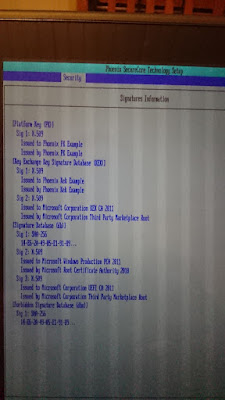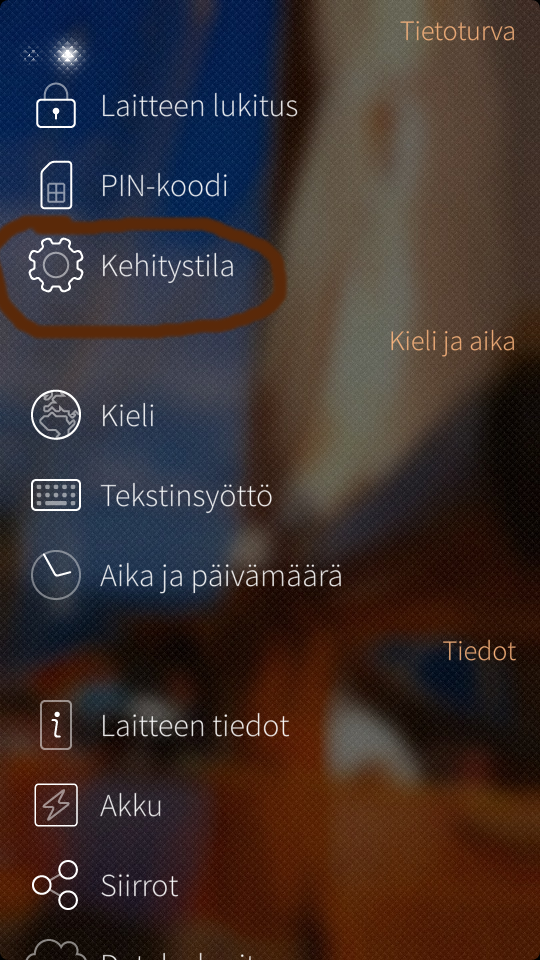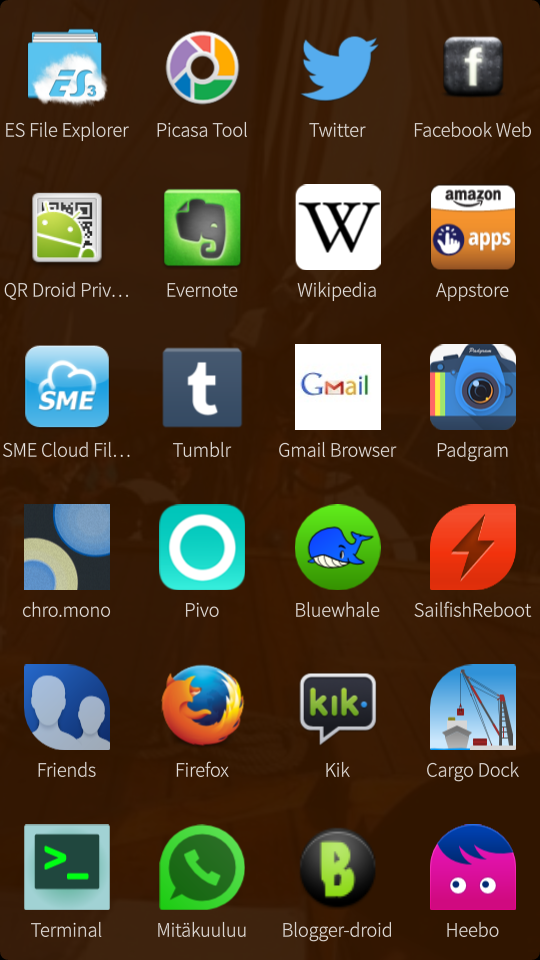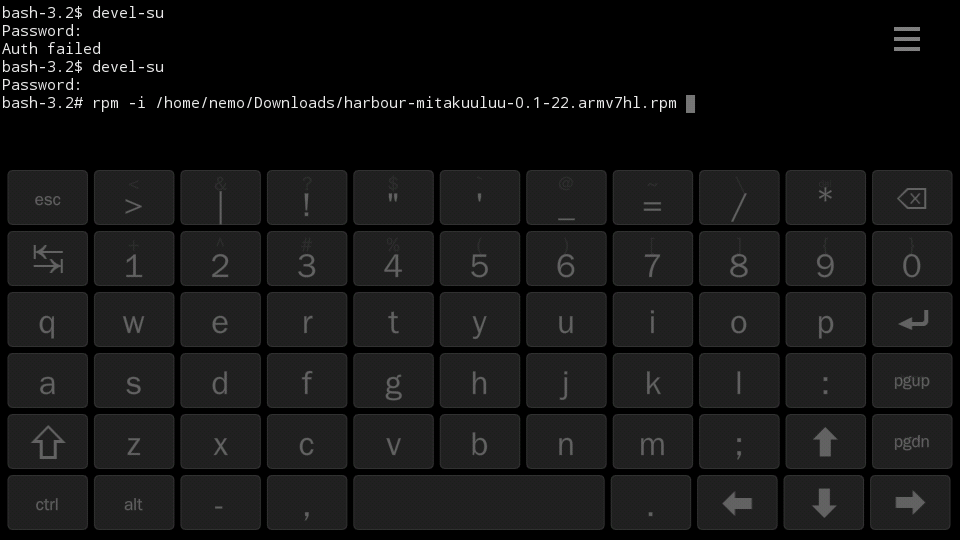As the third experiment,
- inspired by Review Jolla -,
... I tried to change a newer factory image to Jolla Tablet, to see if it really works with the same image as the IGG backer tablet - SFOS 1.1.9.24 instead of 1.1.9.13. If this worked, I would be able to reset the tablet to factory settings and it would run the same image as the official Jolla tablets.I was able to get the newer factory image from the internet (details per request from the author). The package was named 'AndroidTablet.zip'. It had following contents:
Archive: AndroidTablet.zip
Length Date Time Name
--------- ---------- ----- ----
16777216 01-31-2016 18:50 AndroidTablet/anzhen4-android/recovery.img
16777216 02-07-2016 11:06 AndroidTablet/anzhen4-android/anzhen4_mrd8_boot.img
1610612736 01-31-2016 19:14 AndroidTablet/anzhen4-android/system.img
47 01-31-2016 16:52 AndroidTablet/SailfishOS-1.1.9.24-tbj-0.9.0.41/home.img.lzo.md5
47 01-31-2016 17:16 AndroidTablet/SailfishOS-1.1.9.24-tbj-0.9.0.41/root.img.lzo.md5
91113389 01-31-2016 17:20 AndroidTablet/SailfishOS-1.1.9.24-tbj-0.9.0.41/home.img.lzo
509097722 01-31-2016 17:16 AndroidTablet/SailfishOS-1.1.9.24-tbj-0.9.0.41/root.img.lzo
96256 01-31-2016 16:52 AndroidTablet/AdbWinApi.dll
160256 01-31-2016 16:52 AndroidTablet/fastboot.exe
819200 01-31-2016 16:52 AndroidTablet/adb.exe
--------- -------
2245454085 10 files
The files in the 'SailfishOS-1.1.9.24-tbj-0.9.0.41' directory were the ones to use. I figured, the way to do this, is to replace the tablet's existing '/fimage' directory contents with these. I unzipped the downloaded package, and the 'lzo' images inside it, and mounted 'root.img'. It had following contents:
-rw-r--r--. 1 root root 11993088 14.8.2015 droidboot.img
-rw-r--r--. 1 root root 9550336 14.8.2015 efilinux-user.efi
-rw-r--r--. 1 root root 67108864 14.8.2015 esp.img
-rw-r--r--. 1 root root 10534912 14.8.2015 hybris-boot.img
-rw-r--r--. 1 root root 12158976 14.8.2015 hybris-recovery.img
-rw-r--r--. 1 root root 1831 14.8.2015 partition.tbl
Compared with Jolla Tablet, with Sailfish OS 2.0.1.7, the '/boot' directory looked much the same:
[nemo@Jolla ~]$ cd /boot
[nemo@Jolla boot]$ ls -l
total 108944
-rw-r--r-- 1 root root 11999232 Oct 2 04:15 droidboot.img
-rw-r--r-- 1 root root 9550336 Oct 2 04:07 efilinux-user.efi
-rw-r--r-- 1 root root 67108864 Oct 2 04:08 esp.img
-rw-r--r-- 1 root root 10545152 Jan 12 13:54 hybris-boot.img
-rw-r--r-- 1 root root 12341248 Jan 12 13:54 hybris-recovery.img
-rw-r--r-- 1 root root 1831 Oct 2 03:39 partition.tbl
So, I figured it is similar enough to safely assume it could work. I transferred the compressed image file 'root.img.lzo', along with its checksum containing file 'root.img.lzo.md5' to the tablet using PC connection - first to SD card...
...then 'devel-su', input password, 'cd /fimage/SailfishOS-1.1.9.13-tbj-0.9.0.20' and:
[root@Jolla SailfishOS-1.1.9.13-tbj-0.9.0.20]# cp /media/sdcard/7DE1-1EF5/root.img.lzo.md5 .
cp: overwrite `/fimage/SailfishOS-1.1.9.13-tbj-0.9.0.20/root.img.lzo.md5'? y
[.]# cp /media/sdcard/7DE1-1EF5/root.img.lzo .
cp: overwrite `/fimage/SailfishOS-1.1.9.13-tbj-0.9.0.20/root.img.lzo'? y
I reset to factory settings... it's processing the reset, and finally announces "factory reset successful", and the screen turns black. Power key press returns life to the tablet, which boots up for a while now.
A long while. During which, the display shows Jolla and Intel logos, and nothing else happens.
After 20 minutes, I start to look for other options. I flash the Sailfish OS 1.1.9.13 package again and start over, updating over the air all the way to SFOS 2.0.
Clearly, something went wrong. Directory name? Should I have replaced the 'home.img.lzo' as well? Should I have done this some other way than copying and replacing the files? Should I have checked the permissions on the files?
If anyone has ideas, or experience on the matter, let me know via twitter: @psjuma










